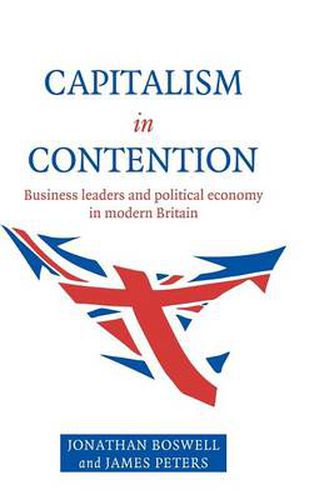Readings Newsletter
Become a Readings Member to make your shopping experience even easier.
Sign in or sign up for free!
You’re not far away from qualifying for FREE standard shipping within Australia
You’ve qualified for FREE standard shipping within Australia
The cart is loading…






Capitalism in Contention examines the ideas of British business leaders on political, economic and social issues since 1960. Using unexplored records, interviews and both narrative and conceptual approaches, it sheds new light on the Wilson, Heath and Thatcher periods from business points of view, on the ‘mixed economy’ and the ‘New Right’, the peak business bodies (CBI, BIM, IOD etc), and business-government relationships. Although the business ideas were often muffled or secreted, they made distinctive contributions to both public policy and thinking about ‘capitalism’. The authors highlight three main ideological tendencies of elite business opinion, ‘revisionism’, ‘liberationism’ and reconstructionism’. These saw business respectively as adaptive partner in a pluralist system, pivot and liberator, and focus of social reconstruction, and their struggle for influence forms a central theme. This book will be of absorbing interest to students of politics, modern history and business, and to policy makers as well as concerned citizens.
$9.00 standard shipping within Australia
FREE standard shipping within Australia for orders over $100.00
Express & International shipping calculated at checkout
Capitalism in Contention examines the ideas of British business leaders on political, economic and social issues since 1960. Using unexplored records, interviews and both narrative and conceptual approaches, it sheds new light on the Wilson, Heath and Thatcher periods from business points of view, on the ‘mixed economy’ and the ‘New Right’, the peak business bodies (CBI, BIM, IOD etc), and business-government relationships. Although the business ideas were often muffled or secreted, they made distinctive contributions to both public policy and thinking about ‘capitalism’. The authors highlight three main ideological tendencies of elite business opinion, ‘revisionism’, ‘liberationism’ and reconstructionism’. These saw business respectively as adaptive partner in a pluralist system, pivot and liberator, and focus of social reconstruction, and their struggle for influence forms a central theme. This book will be of absorbing interest to students of politics, modern history and business, and to policy makers as well as concerned citizens.